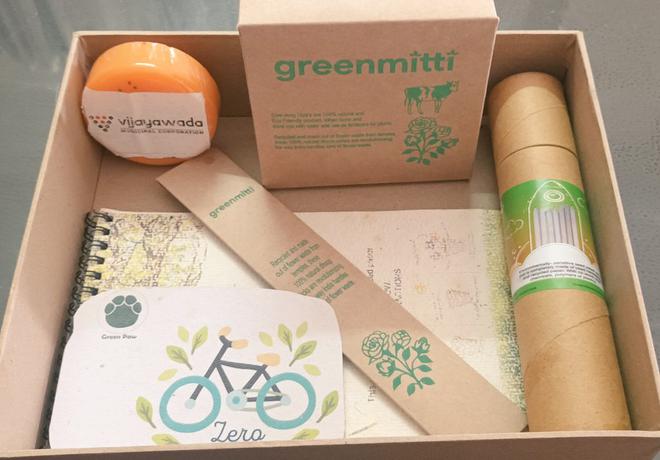Platypus Escapes
Looking at the endless glistening azure waters off Rushikonda Coast, professional scuba diver Subhash Chandra never had an inkling of what awaited him when he went for swim on a clear day in 2019. He wasn’t greeted to a world of marine wonders as he had imagined. Instead, his legs repeatedly got entangled in plastic wastes, discarded cloth and ghost nets.
To assess the underwater situation, Subhash along with a friend went free diving near the coast and were that’s when reality dawned on him. “I was aghast to see the situation. The filth beneath the blue waters was shocking! We saw 100 metres of garbage settled on the sea bed” says Subhash, founder of a scuba-diving institute Platypus Escapes. After two hours, they ended up pulling out 400 kilograms of trash and eventually collecting 7,000 kilograms of underwater waste in the next few days. Their efforts were acknowledged by Prime Minister Narendra Modi in his Sunday’s Mann Ki Baat.
That was the beginning of the humongous task of ocean cleanup, which Subhash embarked upon along with his team and a growing number of volunteers who joined hands with him. Since then, they have completed 88 ocean cleanups and cleared 53,000 kilograms of garbage from the seabed.
On June 8 on the occasion of World Ocean Day, Subhash is planning his biggest ocean cleanup event at Rushikonda. Around 60 trained volunteers will be a part of the event that is expected to see participation from people from all walks of life. “These volunteers have gone through a 10-day ocean swimming training and are adept at assisting the others for the ocean clean-up. We will be clearing trash up to three feet deep of water, which is comfortable even for non-swimmers,” says Subhash. The trash will be collected in a floater mesh bag designed by the team of Platypus Escapes and can hold up to 250 kilograms of garbage.
A report by NASA’s Earth Observatory highlighted that ‘about eight million tons of plastic flow from rivers and beaches into the ocean every year’. These plastics are carried by ocean currents and broken down by waves and sunlight into small microplastics that are now part of the floating plankton – the base of the food web in the ocean, the report further added. “At Rushikonda, the plastic pollution has deeply affected the corals. In the past four years, the underwater ecosystem has been disturbed to a large extent,” says Subhash.
(To register for the ocean cleanup event, call 7622893711)
Greenwaves Environmental Solutions

From tackling electronic wastes to recycling temple flower waste and marine waste, Greenwaves Environmental Solutions has been working towards making peace with Nature through their sustainable products.
The organisation has been closely working with the Vijayawada Municipal Corporation to recycle flower waste from temples in the city and flower markets. Every day, around 1 ton of flower waste is collected , which otherwise was dumped into water bodies. These are recycled into incense sticks, dhoop, seed paper, soaps and natural dyes and also used to create compost and seed balls. “This year we plan to disperse 1 lakh seed balls of fruit bearing and native plants,” says Anil Potluri, founder of Greenwaves Environmental Solutions.
The organisation has been recycling and upcycling marine litter, especially ghost gear in the coasts of Visakhapatnam and Goa. Ghost gear, which are discarded, lost or abandoned fishing gear, contributes significantly to marine plastic pollution and are a mortal threat to species like whales, dolphins, turtles and other marine creatures. According to a report by Greenpeace, an estimated 6.40 lakh tonnes of ghost gear enter the ocean every year, making up 10 % of the plastic waste in the ocean.
In 2021, Greenwaves had initiated a marine litter recycling project in Visakhapatnam which was halted due to various reasons.
“By July, we will be starting a new project in the city on marine litter recycling. Our plan is to engage with the fishing communities, train them and assist them in getting income out of the project,” says Anil.
(To order their products, reach out to 9676152910)
India Youth for Society
Indian Youth for Society (IYFS) has taken up a series of campaigns to spread awareness on environment conservation and plastic pollution. Through its ‘Clear Coasts Campaign’ started last year, beach cleanups drives were held and about 35 tons of garbage were collected. The cleanups were held in collaboration with local communities, educational institutions and government bodies, wherein responsible waste management practices were also highlighted.
The NGO is presently working with two schools in Visakhapatnam as a pilot programme with a six-week art curriculum, designed for Class III students. As part of this programme, theme-based events are conducted every week for the children.
The organisation is also working on a plastic recycling project to promote sustainable solutions and serve as a model for efficient plastic waste management. A plastic recycling plant was established in 2018 in collaboration with the Greater Visakhapatnam Municipal Corporation (GVMC) which has a capacity to handle two tons of plastic every day through a mechanical recycling process known as extrusion.
“The recycling plant is at GVMC dumping yard at Kapuluppada. Every Saturday, it is open for school and college students when we demonstrate waste handling practices,” says Appala Reddy Yendreddi, founder of India Youth for Society.
The organisation has been promoting eco-friendly alternatives like cloth and jute bags, steel straws and wooden tooth brushes through its store Green Initiatives at CBM Compound.
(To plan a visit to the recycling plant or procure products, call 9951958686)







